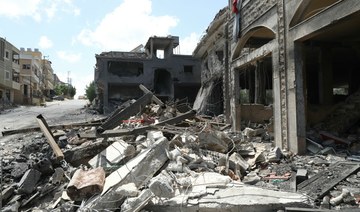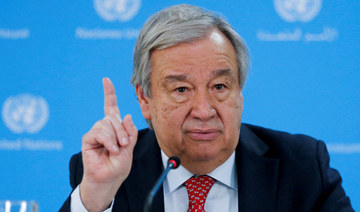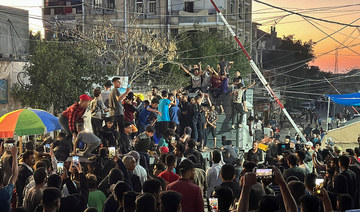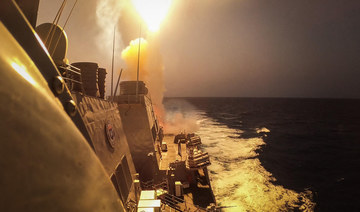BAGHDAD: The Iraqi government’s move this week to place Iranian-backed militias under the command of the armed forces is a political gamble by a prime minister increasingly caught in the middle of a dangerous rivalry between Iran and the U.S, the two main power brokers in Iraq.
Facing pressure from the US to curb the militias, the move allows Prime Minister Adel Abdul-Mahdi to demonstrate a tough stance ahead of a planned visit to Washington, expected to take place in the coming weeks. It is unlikely, though, that he would be able to rein in the powerful Iran-supported militias, and he risks coming off as a weak and ineffective leader if he doesn’t.
Besides having built credibility as an effective force against the Daesh group, the mainly Shiite militias, known collectively as the Popular Mobilization Forces, are a significant political force, with government ministers and 48 seats in the 329-member parliament.
The PMF “is among the parties that achieved victory for Iraq against (the Daesh group), liberating Mosul and restoring security to the country. The time has come to organize their status in a legal way... meaning no weapons outside the framework of the state,” Abdul-Mahdi told reporters at a weekly news conference Tuesday.
That’s a tough sell in a country awash with arms and militias, many of which operate outside the state’s control.
The leaders of the larger militias, like Asaib Ahl Al-Haq, Badr and the Peace Brigades, welcomed the decision, calling it a step in the right direction. But one militia leader said his group has secret offices that they will not close, calling Abdul-Mahdi’s decision a “US directive.” Speaking to The Associated Press on condition of anonymity, he said the prime minister and the Americans “are dreaming” if they think they can implement the decision.
The PMF emerged following a call in the summer of 2014 by Iraq’s top Shiite cleric, Grand Ayatollah Ali Al-Sistani, for volunteers after Daesh militants overran nearly a third of Iraq, including the northern city of Mosul, Iraq’s second-largest. Iraq’s military and security forces collapsed in the face of the onslaught.
Tens of thousands heeded the cleric’s call, enlisting in multiple militia factions, many of which had existed for years and even fought American forces in Iraq following the 2003 invasion. Sanctioned by the Iraqi government but dominated by Shiite groups with close ties to Iran, the militias played a key role in the war against IS and the protection of Shiite shrines in Iraq. They came out of the war with the image of an almost holy force defending Iraq’s Shiite Muslim majority.
That has helped enshrine the militias as a major political and paramilitary player in post-IS Iraq, despite US suggestions that they should be disbanded after IS was driven from the country. Militia factions armed with tanks and heavy weapons are present in almost every Iraqi province, in many cases deeply embedded in local governance and rivaling state institutions. Together, they are believed to number more than 140,000 fighters.
The groups’ expanding power, including in some strategic predominantly Sunni areas, worries not only Iraq’s Sunni minority but also some officials in the military and the Shiite-led government, who fear the militias will dominate Iraq the way the paramilitary Revolutionary Guard does Iran and the militant group Hezbollah does Lebanon.
“The Iranian regime’s objective remains to incorporate the (PMF) as an independent formation within the military structure, a la IRGC, to become an Iraqi Revolutionary Guard,” said Joe Macaron, resident fellow at the Arab Center Washington DC, referring to Iran’s Revolutionary Guard. “However, there is another Iraqi view within the Shiite establishment that calls for fully integrating the militias in the military.”
In March 2018, then-Prime Minister Haider Al-Abadi sought to contain the Iranian-backed militias in Iraq by formally making them part of the armed forces — based on a parliament vote in November 2016 — but the militias remained largely independent.
Abdul-Mahdi’s decree, issued Monday night, went further than just placing them under the army’s command. It ordered the militias to relinquish their militia names and shut down their local headquarters and economic offices. It gave them until the end of the month to comply and said those who do not wish to do so can transform into unarmed political parties. Any armed faction working “openly or secretly” against the new rules would be considered illegitimate.
It did not say how the order would be implemented, nor did Abdul-Mahdi address that at his press conference on Tuesday.
The timing of the decree was noteworthy, amid spiraling tensions between the US and Iran and a string of unclaimed attacks on US interests in the country that have added to regional jitters and raised fears Iraq could be a become a battleground. The attacks, including rockets fired near the US Embassy and US military bases, have embarrassed the Iraqi leadership, making its delicate balancing act between its two allies significantly more difficult.
While clearly seeking to cater to the US, the move by Abdul-Mahdi was also clearly coordinated with Iran, with the understanding that these groups will not be disbanded, nor fully integrated into the military.
Critics called it a toothless decision that will not translate on the ground.
“These factions will not respond to the government, especially (because) they are ideologically aligned with Iran and directly receive orders from Tehran,” said Iraqi political analyst Watheq Al-Hashimi.
Thafer Al-Ani, a Sunni lawmaker, said he hoped it will not be merely “ink on paper,” adding that it would have been better to merge the PMF with the security forces and abolish the militias completely. Under the prime minister’s decree, the PMF reports to a military commander who reports directly to the premier, rather than being fully incorporated into the defense or interior ministries.
Macaron said Abdul-Mahdi is buying time as he is under pressure from both Washington and Tehran.
Formally placing the PMF under the command of the Iraqi military may be a way of deterring an attack by the US or others. American officials have suggested the US would retaliate against any attack targeting US interests in Iraq.
“Some in Washington and the Arab world are welcoming this Iraqi decree with jubilation but the fact is it will not be implemented without Iranian consent,” Macaron said.
“It actually preserves and legitimizes Iranian influence on the long-term,” he added.
Iraqi PM takes a gamble with move on Iran-backed militias
Iraqi PM takes a gamble with move on Iran-backed militias
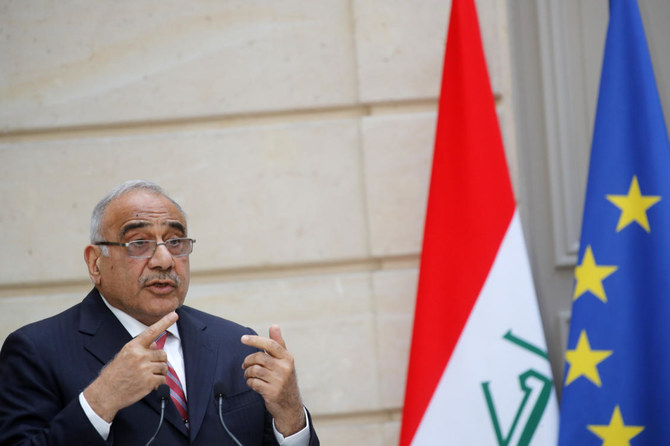
- The leaders of the larger militias, like Asaib Ahl Al-Haq, Badr and the Peace Brigades, welcomed the decision, calling it a step in the right direction
- The move allows Prime Minister Adel Abdul-Mahdi to demonstrate a tough stance ahead of a planned visit to Washington
HRW: Israel attack on Lebanon rescuers was ‘unlawful’
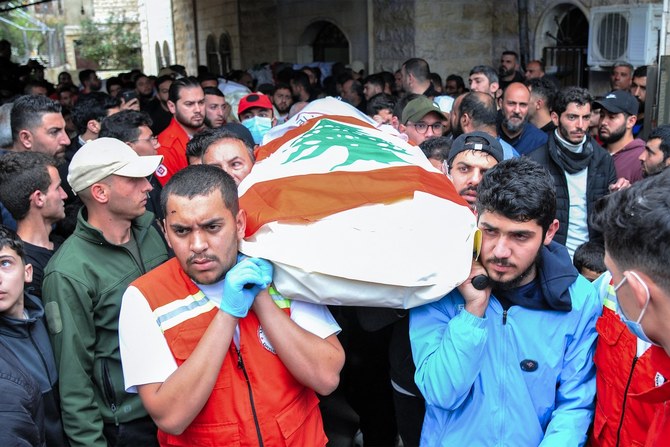
- The rights group urged the United States to “immediately suspend arms sales and military assistance to Israel
Beirut: Human Rights Watch said Tuesday an Israeli strike in Lebanon that killed seven first responders was “an unlawful attack on civilians,” and urged Washington to suspend weapons sales to Israel.
The Israel-Lebanon border area has witnessed near-daily exchanges between the Israeli army and Hamas ally Hezbollah since the Palestinian militant group attacked southern Israel on October 7 sparking war in Gaza.
“An Israeli strike on an emergency and relief center” in the southern village of Habariyeh on March 27 “killed seven emergency and relief volunteers” and constituted an “unlawful attack on civilians that failed to take all necessary precautions,” HRW said in a statement.
“If the attack on civilians was carried out intentionally or recklessly, it should be investigated as an apparent war crime,” it added.
The Israeli military did not immediately comment when contacted by AFP.
But at the time the military said the target was “a military compound” and that the strike killed a “significant terrorist operative” from Jamaa Islamiya, a Lebanese group close to Hamas, and other “terrorists.”
HRW said in the statement that it found “no evidence of a military target at the site,” and said the Israeli strike “targeted a residential structure that housed the Emergency and Relief Corps of the Lebanese Succour Association, a non-governmental humanitarian organization.”
Jamaa Islamiya later denied it was connected to the emergency responders, and the association told AFP it had no affiliation with any Lebanese political organization.
HRW said “the Israeli military’s admission” it had targeted the center in Habariyeh indicated a “failure to take all feasible precautions to verify that the target was military and avoid loss of civilian life... making the strike unlawful.”
The rights group said those killed were volunteers, adding that 18-year-old twin brothers were among the dead.
“Family members... the Lebanese Succour Association, and the civil defense all said that the seven men were civilians and not affiliated with any armed group,” it added.
However, it noted that social media content suggested at least two of those killed “may have been supporters” of Jamaa Islamiya.
HRW said images of weapons parts found at the site included the remains of an Israeli bomb and remnants of a “guidance kit produced by the US-based Boeing Company.”
“Israeli forces used a US weapon to conduct a strike that killed seven civilian relief workers in Lebanon who were merely doing their jobs,” HRW’s Lebanon researcher, Ramzi Kaiss, said.
The rights group urged the United States to “immediately suspend arms sales and military assistance to Israel given evidence that the Israeli military is using US weapons unlawfully.”
Israeli military take control of vital Rafah crossing from Gaza into Egypt
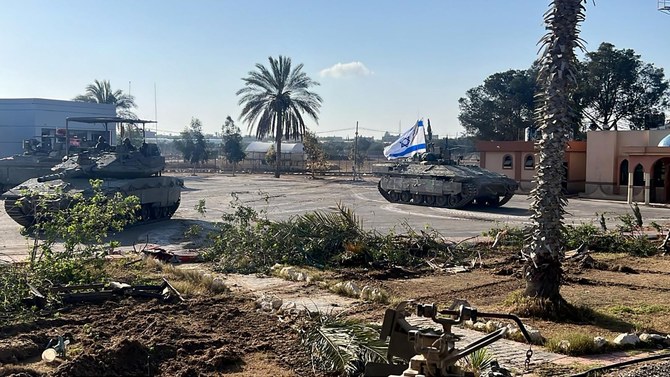
- Israel military takes control of Rafah crossing, special forces scanning area
- Israel says vast majority of people evacuated from military area
JERUSALEM: The Israeli military took control of the vital Rafah border crossing between Gaza and Egypt on Tuesday, pushing into the southern Gazan town after a night of air strikes and as prospects for a ceasefire deal hung in the balance.
The Palestinian militant group Hamas said late on Monday it had agreed to a ceasefire proposal from mediators seven months into the war that has pushed more than a million Gazans into the south of the enclave.
Israel said the terms did not meet its demands and launched a military operation in Rafah.
Israeli tanks and planes pounded several areas and houses in Rafah overnight, killing 20 Palestinians and wounding several others in strikes that hit at least four houses, Palestinian health officials said.
“The Israeli occupation has sentenced the residents of the Strip to death after closure of the Rafah border crossing,” said Hisham Edwan, spokesman for the Gaza Border Crossing Authority. It also condemned to death cancer patients due to the collapse of the health care system, he added.
Israel has been threatening to launch a major incursion in Rafah, which it says harbors thousands of Hamas fighters and potentially dozens of hostages. Victory is impossible without taking Rafah, it says.
Rafah crossing closed
A Gaza border authority spokesperson told Reuters the Rafah crossing, a major route for aid into the devastated enclave, was closed because of the presence of Israeli tanks. Israel’s Army Radio had earlier announced its forces were there.
The United States has been pressing Israel not to launch a military campaign in Rafah until it had drawn up a humanitarian plan for the Palestinians sheltering there, which Washington says it has yet to see.
Israel said the vast majority of people had been evacuated form the area of military operations.
Instructed by Arabic text messages, phone calls and flyers to move to what the Israeli military called an “expanded humanitarian zone” around 20 km (12 miles) away, some Palestinian families began trundling away in chilly spring rain.
Some piled children and possessions onto donkey carts, while others left by pick-up or on foot through muddy streets.
As families dismantled tents and folded belongings, Abdullah Al-Najar said this was the fourth time he had been displaced since the fighting began seven months ago.
“God knows where we will go now. We have not decided yet.”
Truce talks in Cairo
Hamas said in a brief statement that its chief, Ismail Haniyeh, had informed Qatari and Egyptian mediators the group accepted their proposal for a ceasefire.
Israeli Prime Minister Benjamin Netanyahu’s office said later the truce proposal fell short of Israel’s demands but Israel would send a delegation to meet with negotiators to try to reach an agreement.
Qatar’s foreign ministry said its delegation will head to Cairo on Tuesday to resume indirect negotiations between Israel and Hamas.
In a statement, Netanyahu’s office said his war cabinet approved continuing an operation in Rafah. Jordan’s Foreign Minister Ayman Safadi said on social media site X that Netanyahu was jeopardizing a ceasefire by bombing Rafah.
An Israeli official, speaking on condition of anonymity, said the proposal that Hamas approved was a watered-down version of an Egyptian offer and included elements Israel could not accept.
“This would appear to be a ruse intended to make Israel look like the side refusing a deal,” said the Israeli official.
Another official briefed on the agreement said Hamas had agreed to the phased ceasefire and hostage release deal Israel proposed on April 27 with only minor changes that did not affect the main parts of the proposal.
US State Department spokesman Matthew Miller said Washington would discuss the Hamas response with its allies in the coming hours, and a deal was “absolutely achievable.”
Any truce would be the first pause in fighting since a week-long ceasefire in November, during which Hamas freed around half of the hostages.
Since then, all efforts to reach a new truce have foundered over Hamas’ refusal to free more hostages without a promise of a permanent end to the conflict, and Israel’s insistence that it would discuss only a temporary pause.
More than 34,600 Palestinians have been killed in the conflict, according to Gaza health officials. The UN has said famine is imminent in the enclave.
The war began when Hamas militants attacked Israel on Oct. 7, killing about 1,200 people and abducting 252 others, of whom 133 are believed to remain in captivity in Gaza, according to Israeli tallies.
UKMTO receives report two explosions south of Yemen’s Aden
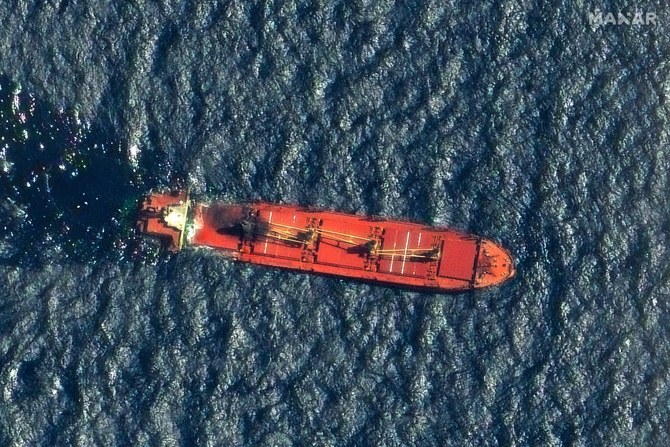
- The Houthi militia that controls the most populous parts of Yemen and is aligned with Iran have staged attacks on ships in the waters off the country for months
Dubai: A merchant vessel passing through the Gulf of Aden off Yemen reported two explosions in “close proximity,” British maritime security agency UKMTO said Tuesday.
The United Kingdom Maritime Trade Operations said the “vessel and all crew are safe,” adding that “authorities are investigating” the blasts south of Yemen’s southern port city of Aden.
UKMTO, which is run by Britain’s Royal Navy, did not provide details on the ship or the nature of attack.
Yemen’s Iran-backed Houthi rebels have launched dozens of drone and missile strikes against ships in the Red Sea and the Gulf of Aden since November.
The Houthis say their campaign is in solidarity with Palestinians amid the Gaza war.
On Friday, they threatened to expand operations targeting Israel-bound shipping to the Mediterranean Sea.
The United States announced an initiative in December to protect Red Sea shipping from Houthi attacks, which have prompted major firms to avoid the route that normally carries 12 percent of global trade.
Since January, the US and Britain have also launched repeated retaliatory strikes on Houthi targets in Yemen.
On Monday, US military forces downed a drone launched by the Houthis over the Red Sea, the US military’s Central Command (CENTCOM) said in a statement.
The drone “presented an imminent threat to US coalition forces and merchant vessels in the region,” CENTCOM said.
Palestinians seek UN General Assembly backing for full membership

- Diplomats say 193-member General Assembly likely to back Palestinian bid
- Others say move could set precedent for others, citing Kosovo and Taiwan as examples
UNITED NATIONS: The United Nations General Assembly could vote on Friday on a draft resolution that would recognize the Palestinians as qualified to become a full UN member and recommend that the UN Security Council “reconsider the matter favorably.”
It would effectively act as a global survey of how much support the Palestinians have for their bid, which was vetoed in the UN Security Council last month by the United States. An application to become a full UN member needs to be approved by the 15-member Security Council and then the General Assembly.
Diplomats say the 193-member General Assembly is likely to back the Palestinian bid. But changes could still be made to the draft after some diplomats raised concerns with the current text, seen by Reuters, that also grants additional rights and privileges — short of full membership — to the Palestinians.
Some diplomats say this could set a precedent for other situations, citing Kosovo and Taiwan as examples.
Israel’s UN Ambassador Gilad Erdan on Monday denounced the current draft General Assembly resolution, saying it would give the Palestinians the de facto status and rights of a state and goes against the founding UN Charter.
“If it is approved, I expect the United States to completely stop funding the UN and its institutions, in accordance with American law,” said Erdan, adding that adoption by the General Assembly would not change anything on the ground.
US CONCERNS
Under US law, Washington cannot fund any UN organization that grants full membership to any group that does not have the “internationally recognized attributes” of statehood. The US halted funding in 2011 for the UN cultural agency (UNESCO)after the Palestinians became a full member.
“It remains the US view that the path toward statehood for the Palestinian people is through direct negotiations,” said Nate Evans, spokesperson for the US mission to the UN
“We are aware of the resolution and reiterate our concerns with any effort to extend certain benefits to entities when there are unresolved questions as to whether the Palestinians currently meet the criteria under the Charter,” he said.
The Palestinians are currently a non-member observer state, a de facto recognition of statehood that was granted by the UN General Assembly in 2012. The Palestinian mission to the UN in New York did not immediately respond to a request for comment on its push for action in the General Assembly.
The Palestinian push for full UN membership comes seven months into a war between Israel and Palestinian militants Hamas in the Gaza Strip, and as Israel is expanding settlements in the occupied West Bank, which the UN considers to be illegal. The United Nations has long endorsed a vision of two states living side by side within secure and recognized borders.
Palestinians want a state in the West Bank, east Jerusalem and Gaza Strip, all territory captured by Israel in 1967.
Palestinians seek UN General Assembly backing for full membership
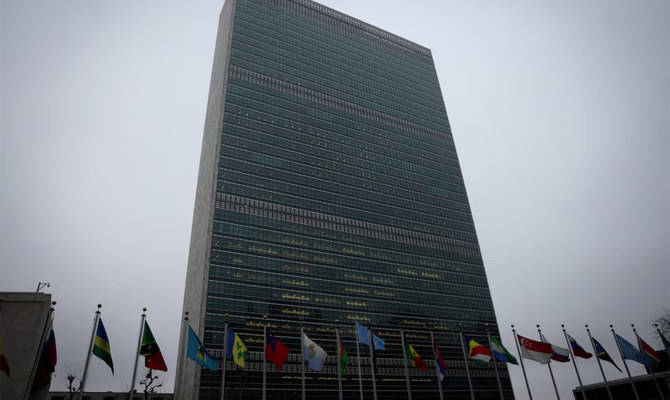
- Diplomats say the 193-member General Assembly is likely to back the Palestinian bid
UNITED NATIONS: The United Nations General Assembly could vote on Friday on a draft resolution that would recognize the Palestinians as qualified to become a full UN member and recommend that the UN Security Council “reconsider the matter favorably.”
It would effectively act as a global survey of how much support the Palestinians have for their bid, which was vetoed in the UN Security Council last month by the United States. An application to become a full UN member needs to be approved by the 15-member Security Council and then the General Assembly.
Diplomats say the 193-member General Assembly is likely to back the Palestinian bid. But changes could still be made to the draft after some diplomats raised concerns with the current text, seen by Reuters, that also grants additional rights and privileges — short of full membership — to the Palestinians.
Some diplomats say this could set a precedent for other situations, citing Kosovo and Taiwan as examples.
Israel’s UN Ambassador Gilad Erdan on Monday denounced the current draft General Assembly resolution, saying it would give the Palestinians the de facto status and rights of a state and goes against the founding UN Charter.
“If it is approved, I expect the United States to completely stop funding the UN and its institutions, in accordance with American law,” said Erdan, adding that adoption by the General Assembly would not change anything on the ground.
US CONCERNS
Under US law, Washington cannot fund any UN organization that grants full membership to any group that does not have the “internationally recognized attributes” of statehood. The US halted funding in 2011 for the UN cultural agency (UNESCO)after the Palestinians became a full member.
“It remains the US view that the path toward statehood for the Palestinian people is through direct negotiations,” said Nate Evans, spokesperson for the US mission to the UN
“We are aware of the resolution and reiterate our concerns with any effort to extend certain benefits to entities when there are unresolved questions as to whether the Palestinians currently meet the criteria under the Charter,” he said.
The Palestinians are currently a non-member observer state, a de facto recognition of statehood that was granted by the UN General Assembly in 2012. The Palestinian mission to the UN in New York did not immediately respond to a request for comment on its push for action in the General Assembly.
The Palestinian push for full UN membership comes seven months into a war between Israel and Palestinian militants Hamas in the Gaza Strip, and as Israel is expanding settlements in the occupied West Bank, which the UN considers to be illegal. The United Nations has long endorsed a vision of two states living side by side within secure and recognized borders. Palestinians want a state in the West Bank, east Jerusalem and Gaza Strip, all territory captured by Israel in 1967.





